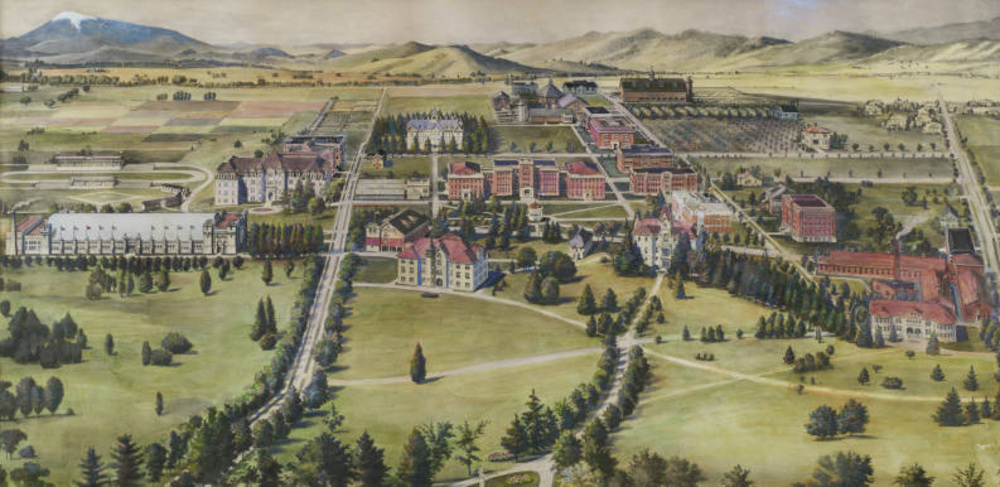Jane Lubchenco is an internationally recognized environmental scientist who has initiated experimental approaches and quantitative methods in the field of intertidal ecology. Her efforts to make science accessible to nonscientific audiences have made her a leader in public education. Throughout her decades-long career at Oregon State University, she has approached her work in collaborative ways that have enriched scientific knowledge and its outcomes. While her research has focused on Oregon’s rocky shores and nearshore oceans, her work and partnerships have extended to ecosystems around the world. Since the 1980s, she has worked extensively to shape public environmental policy through her positions in government and at private institutions.
Jane Ann Lubchenco was born in Denver, Colorado, on December 4, 1947, to parents Michael and LaMeta Dahl Lubchenco. A high school summer enrichment program at the Marine Biological Laboratories in Woods Hole, Massachusetts, was transformative when she was introduced to field research. She attained a Bachelor’s degree in biology at Colorado College and a Master’s in zoology at the University of Washington, where the marine biology program helped shape her thinking through the new field of experimental evolutionary ecology. Lubchenco earned a doctorate in ecology from Harvard University’s Department of Organismic and Evolutionary Biology in 1975. “It was clear,” her mentor James McCarthy later remembered, that “even in her PhD work...what she was doing was going to affect the way that people in the future designed experiments and drew conclusions.”
Lubchenco met fellow graduate student Bruce Menge at the University of Washington, and the two marine biologists married in 1971. In 1977, the couple, who had two sons, joined the faculty at Oregon State University, where they split a fulltime tenure-track assistant professorship in the Zoology Department.
Once at OSU, Lubchenco and Menge began to document the rocky shores and nearshore oceans on the Oregon Coast, which helped them identify the differences between Oregon’s and California’s coastal ecology. Since then, their research has provided not only detailed knowledge of the Oregon coastline and ocean health but also has served as the baseline for measuring oceanic pollution, acidification, and multiyear dead zones along the coast.
Beginning in the 1980s, Lubchenco observed the rapid changes to marine ecosystems occurring around the globe and became an outspoken advocate for new and better public policy. She and Menge founded the Partnership for Interdisciplinary Studies of Coastal Oceans to extend scientific experiments across larger geographical coastline areas. Their work has taken Lubchenco to such places as Central America, South America, China, and the Aegean and Black Seas.
As her body of work and her stature in the scientific world grew, Lubchenco found opportunities to influence policy. In 2009, President Barack Obama appointed her as the first woman and first marine biologist to lead the National Oceanic and Atmospheric Administration. During her four-year tenure at NOAA, Lubchenco shaped policies on coastline management and fisheries and funded the next generation of weather satellites. Under her leadership, NOAA responded to the massive oil spill from British Petroleum’s Deepwater Horizon oil rig in the Gulf of Mexico in 2010. In 2011, Lubchenco relocated NOAA’s Pacific Marine Operations Center, the heart of the agency’s research mission, from Seattle to Newport, Oregon, drawing the ire of Washington politicians, concerns from PMOC staff, and praise from Newport officials.
Lubchenco refers to the scores of students she has mentored at OSU and other institutions as her “academic children.” She created the Leopold Leadership Program (1998), now the Earth Leadership Program at Stanford University, and the Communication Partnership for Science and the Sea, or COMPASS (1999), based in Clackamas, Oregon, to train scientists to become leaders and effective communicators. She has repeatedly advocated for scientists “to be bilingual—speaking the language of science and laypeople.”
Lubchenco is a University Distinguished Professor and the Wayne and Gladys Valley Professor of Marine Biology at Oregon State University. She also serves as the Marine Studies Advisor to the provost and the president of OSU. In March 2021, OSU loaned her to the White House when she was named the Biden-Harris Administration’s Deputy Director for Climate and Environment for the White House Office of Science and Technology Policy.
In 2022, the National Academy of Sciences sanctioned Lubchenco for violating its code of conduct: she had edited a paper published in the Proceedings of the National Academy of Sciences that was written by scientists with whom she had personal or professional relationships. PNAS sanctions are in place for five years. The article was retracted, and Lubchenco expressed regret for her error in judgment. The publication of the article occurred before she joined the Biden Administration, but some politicians have called for her resignation or termination in response to the sanctions.
The recipient of a MacArthur Fellowship in 1993, Lubchenco is a member of the American Academy of Arts and Sciences (1993), the National Academy of Sciences (1996), and the Royal Society (2004). She is an Honorary Member for Life of the British Ecological Society (2001), has been honored with the Woman of Achievement Award from the Oregon Commission for Women (2011), and was named an Oregon History Maker by the Oregon Historical Society (2017).
Lubchenco continues to influence public policy on environmental issues, particularly the health of the oceans. “The ocean is not too big to fail, nor is it too big to fix,” she said in 2020, summing up her view on the importance of ocean health. “But it is so central to our health, prosperity and well-being that it is too big to ignore.”
-
![]()
Dr. Jane Lubchenco, c.1991.
Courtesy Oregon State University Libraries -
![]()
Dr. Jane Lubchenco.
Courtesy NOAA -
![]()
Dr. Jane Lubchenco accepting OHS History Makers award, 2016.
Oregon Historical Society -
![]()
Related Entries
-
![Climate Change in Oregon]()
Climate Change in Oregon
Within a few hundred miles in Oregon, you can see snowy volcanoes, parc…
-
![Oregon Climate Change Research Institute]()
Oregon Climate Change Research Institute
The Oregon Climate Change Research Institute was established in 2007 to…
-
![Oregon State University]()
Oregon State University
Oregon State University (OSU) traces its roots to 1856, when Corvallis …
-
![Warren Morton Washington (1936–2024)]()
Warren Morton Washington (1936–2024)
A groundbreaking climate scientist, Warren M. Washington played a major…
Map This on the Oregon History WayFinder
The Oregon History Wayfinder is an interactive map that identifies significant places, people, and events in Oregon history.
Further Reading
German, Ben. "White House Climate Official Sanctioned by Key Science Body." Axios (August 16, 2022).
Knickerbocker, Brad. “Conversations With Outstanding Americans: Jane Lubchenco.” The Christian Science Monitor (August 15, 1997).
Jane Lubchenco Website. https://www.janelubchenco.com/
"Jane Lubchenco from Oregon State University on Dead Zones." C-Span, April 6, 2021. Video.








